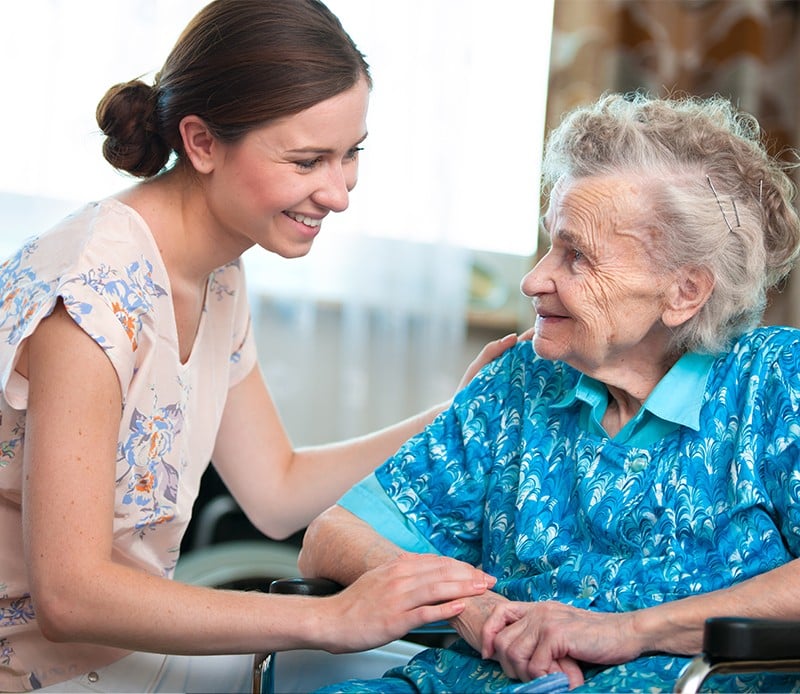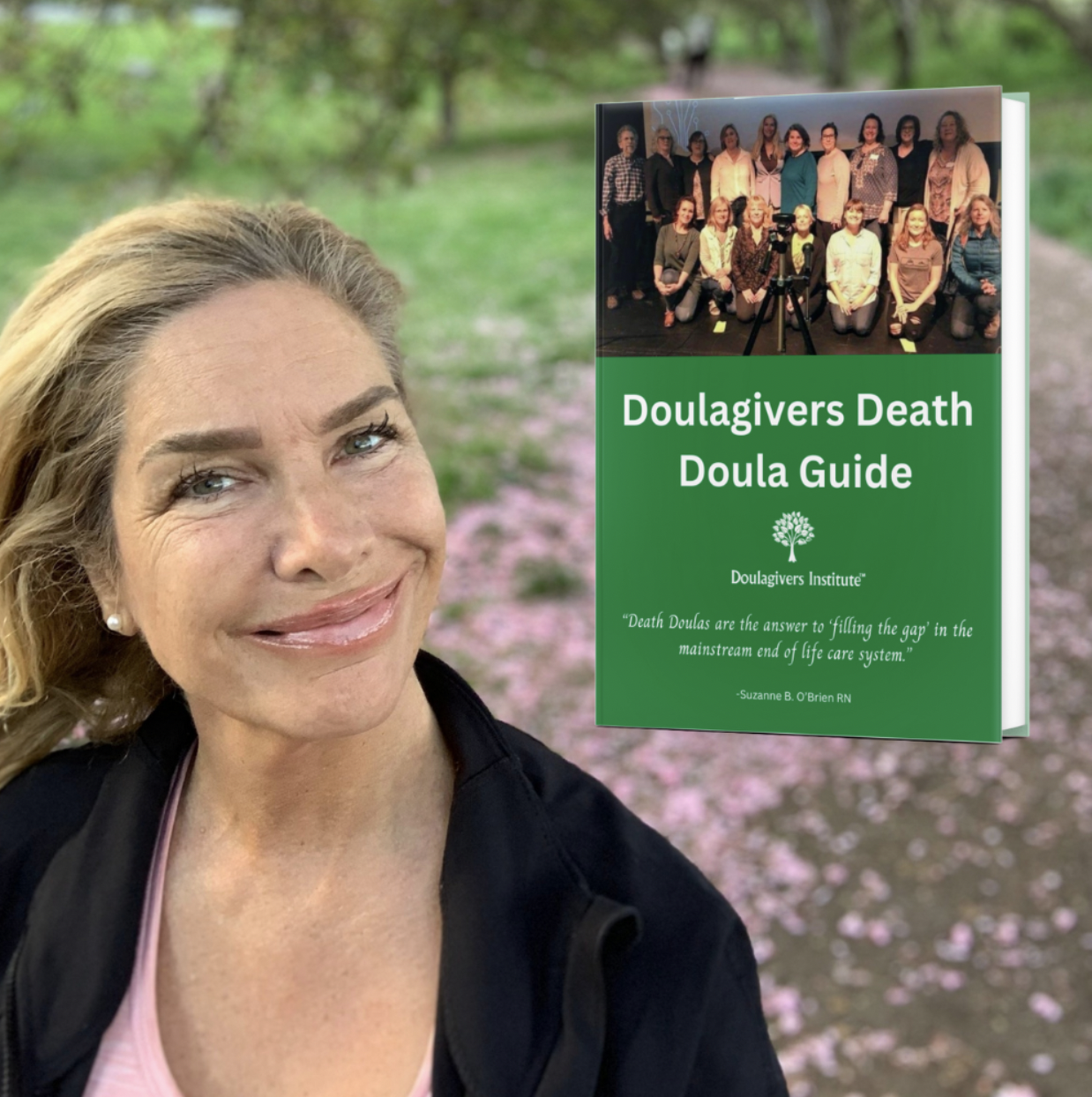The Power of the Doulagivers Specialist
In 2017, Time Magazine dubbed Death Doulas as one of the newest career choices blossoming in the United States. Maybe you’ve heard of the term Death Doula (or End of Life Doula) before, or perhaps it’s a foreign concept that you are just now hearing about. For those of you who haven’t heard of this profession before, a Death Doula is a non-medical person trained to care for someone holistically (physically, emotionally and spiritually) at the end of life.
The professional End of Life Doula has become very popular recently – and for good reason. More Americans are catching on to the exorbitant costs of end of life care and are straying from the conventional institutions of yesterday and opting for higher quality of life options. By hiring a death doula in conjunction with hospice, a person is granted the ability to spend the end of their life at home or in another comfortable, familiar location that is preferred. This is a very appealing practice given that more than half of Americans currently die in a hospital or nursing home – environments that are void of personalized tranquility.
End of Life Becoming Less Taboo
We are entering a time where speaking about death and dying is becoming less taboo for people. There has been a significant rise in the number of Americans seeking practical and effective ways to ensure their end of life goes as smoothly as possible. But are Death Doulas really the key to reshaping the way we die in America?
According to a 2018 U.S. Census Bureau report, in the year 2035 “there will be 78 million people 65 years and older compared to 76.4 million under the age of 18.” Which means, for the first time in the country’s history, the elderly population will outnumber that of children. This historical demographic shift is going to lead to a host of unique public health challenges in America.
The Physician Shortage
We know there is going to be an unprecedented rise in the number of older adults requiring assistance services and inevitably, end of life care services, over the next several decades… but why can’t they rely on doctors and institutions for their care? Besides the current trend of Americans desiring to stay at home rather than residential care facilities at the end of life, there is another big problem facing America’s aging population – a palliative care physician shortage.
The Association of American Medical Colleges (AAMC) projects that the shortage in medical end of life care doctors remains real and significant, with a shortfall of up to 122,000 physicians by the year 2032. Likewise, a survey conducted by Duke Researchers using 2018 workforce data of specialty hospice and palliative care clinicians concluded a shortage of these professionals is approaching and will have a strong impact on those eligible for Medicare health insurance.
“All scenarios demonstrated a worsening of the patient-to-physician ratio for at least 25 years (2020–2045), due to an inadequate physician supply,” according to these researchers. The data analysis estimated that there is one available palliative care physician per 808 eligible patients. What does this mean for Americans in the near future? Quite literally that mainstream medical care services may not even be a practical option for those who would prefer them at end of life. The convergence of these two issues (a rapid increase in the elder population and shortage of end of life care physicians) means that America is on the brink of an eldercare crisis. The swelling demographic of elder Americans is going to create multifaceted challenges within communities around the country. To combat this issue, there is going to be a necessity for new and innovative solutions.
Silver Tsunami
This is an issue we have been talking about for years and in the industry, we refer to it as the “Silver Tsunami.” By now we have all heard about “the curve” relating to the coronavirus pandemic. It represents the number of people being infected who require medical treatment in a particular period of time. When the curve rises above the healthcare system’s threshold, it collapses the system and our doctors and nurses cannot give adequate treatment to everyone due to a shortage of personnel and equipment, causing the mortality rate to rise dramatically. That is why so many places around the world have introduced strict social distancing measures and increased hygiene practices in an attempt to “flatten” this curve of COVID-19 patients. It is not meant to lower the amount of infections, but rather to stretch the number of infections over a longer period of time, keeping the high point of the curve below the healthcare system’s threshold throughout the course of the pandemic.
Curve Concept
This curve concept is the same with our current eldercare crisis in America. It is the same principle, but over a longer time period… and involving many, many more patients. We 
By greatly expanding palliative care services on a national level, as well as introducing a new workforce of non-medical healthcare professionals such as Doulagivers, we will be able to combat this crisis. The need for non-medical healthcare professionals to compliment and assist our current healthcare structure will be in the tens of millions over the next 20 years. The need is real and the time to meet the need is now. This is where the End of Life Doula comes into the picture.
Doulagviers Specialist Bridges The Gap
When a person is entering their last phase of life, an End of Life Doula helps guide this individual through their end of life process, whatever it may be. They also offer emotional support to grieving families and loved ones during and after death, assisting the family to “reenter life after loss.” As the population of older adults in America increases, so too will the demand for related services and care. We know that the use of End of Life Doulas will be extremely important to these older adults when they are nearing the last stages of life, but what about before then? This is where the power of the Doulagivers Specialist lies. A Certified Doulagivers Specialist is trained in three crucial areas of care (Eldercare, Care Consulting, and End of Life Doula services). This three-pronged approach provides the most complete and effective skillset to limiting the impact of the imminent eldercare crisis currently facing America.
Eldercare Doulas

Care Consultant
Once the trust has been built with the client, the Doulagivers Specialist can segue into the role of a Care Consultant. This is a crucial step in making the end of life as pleasant an experience as possible for people – one that is far too often overlooked. This is where the Specialist helps their client plan ahead. With all the knowledge the client will ever need, the Doulagivers Specialist can assist them with making subjective choices about the way they would like to be cared for in the future and end of their life, as well as where and by whom. The Specialist will assist the client with filling out and organizing all vital documents to secure their wishes for physical care and financial affairs including: Advance Directives, Healthcare Proxy, Wills/Trusts, and Power of Attorney. Once these forms are completed, the Specialist will be responsible for distributing these documents to all necessary parties (family members, healthcare proxies, medical doctors, attorneys, etc.) As a Care Consultant, the Specialist will arrange and mediate family meetings, sharing the client’s wishes for aging and end of life. They will allow the family and loved ones to ask questions and educate them on all decisions and terminology. In doing so, the Doulagivers Specialist can provide their clients with a much more comprehensive and effective end of life care plan than an individual without this knowledge base could complete on their own – for a fraction of the cost.
Now that the Doulagivers Specialist has developed a relationship with their client and constructed a comprehensive care plan for them ahead of time, their End of Life Doula services are the final piece of the puzzle. When the time comes, the Specialist is already established with the patient and has expressed the patient’s wishes to the family and loved ones, allowing the Specialist to be immediately available to switch roles into end of life care. Remember that this does not end with the passing of the patient, but with the bereavement process of the loved ones. It is a beautiful, all-encompassing solution to providing the highest quality of life to our elders and their families.
Is this the career opportunity you have been waiting for?
Starting a new business is no easy feat and in an emerging profession that most people don’t yet know about, it can be difficult to secure fulltime work and pay. The Doulagivers Specialist Bundle is the best way for a Doula to start their own business and ensure that they have a range of useful knowledge and services to provide. This allows the Doula to create a steady source of income for themselves when they are not actively in “the space” of a patient nearing their final moments. Having the ability to offer Eldercare services and Care Consulting services also allows the Doula to work without feeling pressured to take on patient after patient, potentially exposing themselves to physical, mental, and/or emotional exhaustion.
"The elder care crisis is upon us and it will take a three-fold response to solve it. Having worked in the end of life space as a hospice and oncology nurse, I know how most end of life experiences today are leaving a lifetime of pain and regret for families and loved ones. How did we get to a place where a natural part of our life journey is so dysfunctional? Coming in to support someone at the very end of life as a death doula is wonderful - but it will not change the present overall crippling culture of death. To do that, we need to start educating and discussing our aging and end of life preferences and choices way before we ever get there." - Suzanne B. O'Brien RN CEO and Founder of Doulagivers
Training The Specialist
Training as a Doulagivers Specialist and establishing your business services now within your community will put you well ahead of the curve and in a great position as the need for these services skyrockets over time. A time when the term End of Life Doula will become as common as Mortician in American households (we don’t necessarily strike up conversations about them regularly, but we know what they do and when to contact them when we require their services) is only a matter of years away. To truly help our aging population and offer a sensible, systematic, and practical solution to America’s eldercare crisis, it starts before the end of life. That is what sets the Doulagivers Specialist apart and what makes them so powerful in the emerging field of non-medical end of life professionals.






